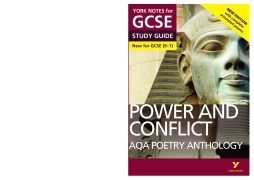
Additional Information
Book Details
Abstract
To achieve top grades in English Literature, you need to know your set texts and master all the key skills examiners are looking for. With everything you need right at hand, this NEW York Notes Study Guide on Power and Conflict: AQA Poetry Anthology Ð now with complete annotated poems! Ð gives you all the tools you need to study the cluster, practice Unseen poetry and face your exam with confidence.
Read and understand all the poems Ð Find every poem, printed in full with lots of expert annotations, to help you read, understand and write about the cluster.
Practice all the key skills Ð Use the dedicated sections on Form, Structure and Language and Themes and Contexts to perfect your knowledge and master the key techniques. Plus, get help with Comparing poems and the Unseen poem questions.
Check your progress Ð Use the regular ÔProgress and revision checkÕ features to test your knowledge and understanding, and monitor what you have achieved.
Feel ready for the exam Ð Key features linked to the Assessment Objectives, longer exam-style ÔPractice tasksÕ and annotated sample answers at different levels, will help you to be exam-ready and prepared to perform at your best.
Table of Contents
| Section Title | Page | Action | Price |
|---|---|---|---|
| Front Cover | Front Cover | ||
| Contents | 3 | ||
| Part One: Getting Started | 5 | ||
| Preparing for assessment | 5 | ||
| How to use your York Notes Study Guide | 6 | ||
| Part Two: Exploring the Poems | 7 | ||
| How to read and study a poem | 7 | ||
| Percy Bysshe Shelley: ‘Ozymandias’ | 8 | ||
| William Blake: ‘London’ | 11 | ||
| William Wordsworth : Extract from, ‘The Prelude’ | 14 | ||
| Robert Browning: ‘My Last Duchess’ | 18 | ||
| Alfred Lord Tennyson: ‘The Charge of the Light Brigade’ | 22 | ||
| Wilfred Owen: ‘Exposure’ | 26 | ||
| Seamus Heaney: ‘Storm on the Island’ | 30 | ||
| Ted Hughes: ‘Bayonet Charge’ | 33 | ||
| Simon Armitage : ‘Remains’ | 36 | ||
| Jane Weir: ‘Poppies’ | 39 | ||
| Carol Ann Duffy: ‘War Photographer’ | 41 | ||
| Imtiaz Dharker: ‘Tissue’ | 44 | ||
| Carol Rumens: ‘The Emigrée’ | 48 | ||
| John Agard: ‘Checking Out Me History ’ | 51 | ||
| Beatrice Garland: ‘Kamikaze’ | 55 | ||
| Progress and revision check | 57 | ||
| Part Three: Themes and Contexts | 59 | ||
| Themes | 59 | ||
| Social structures and power | 59 | ||
| Resisting oppression | 60 | ||
| Social control | 61 | ||
| Responsibility | 61 | ||
| War – participation | 62 | ||
| War – being left behind | 62 | ||
| Attitudes to war | 63 | ||
| The effects of war | 63 | ||
| Nature | 64 | ||
| Memory | 65 | ||
| Art | 66 | ||
| Contexts | 67 | ||
| Progress and revision check | 69 | ||
| Part Four: Form, Structure and Language | 70 | ||
| Form | 70 | ||
| Structure | 72 | ||
| Language | 76 | ||
| Voice and viewpoint | 76 | ||
| Imagery | 77 | ||
| Simile | 77 | ||
| Personification | 78 | ||
| Vocabulary choices | 79 | ||
| Register | 79 | ||
| Connotations | 80 | ||
| Semantic field | 80 | ||
| Tone and mood | 81 | ||
| Progress and revision check | 82 | ||
| Part Five: Comparing Poems in the Cluster | 83 | ||
| The exam | 83 | ||
| Links between poems | 84 | ||
| Exploring ideas and issues in both poems | 86 | ||
| The language of exploration, comparison and contrast | 88 | ||
| Progress check | 88 | ||
| Part Six: Approaching ‘Unseen’ Poems | 89 | ||
| The exam | 89 | ||
| How to approach the first‘unseen’ poem question | 90 | ||
| How to approach the second‘unseen’ poem question | 92 | ||
| Practice task 1 | 93 | ||
| Practice task 2 | 95 | ||
| Progress check | 96 | ||
| Part Seven: Progress Booster | 97 | ||
| Understanding the question | 97 | ||
| Planning your answer | 97 | ||
| Responding to writers’ effects | 100 | ||
| Using quotations | 102 | ||
| Annotated sample answers | 103 | ||
| Practice task 3 | 109 | ||
| Part Eight: Further Study and Answers | 110 | ||
| Literary Terms | 110 | ||
| Checkpoint answers | 112 | ||
| Progress and revision check answers | 113 | ||
| Mark Scheme | 115 | ||
| Back Cover | Back Cover |
